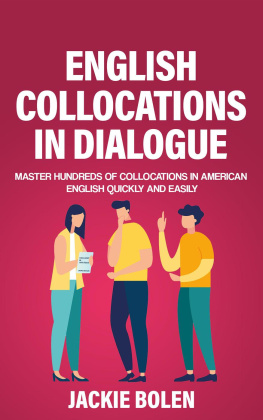
Effortless English is published by Effortless English LLC
1702 A. Street, Ste. C
Sparks, NV 89431
Inquiries: events@effortlessenglishclub.com
Website: www.effortlessenglishclub.com
Copyright 2014 by Effortless English LLC and A.J. Hoge
All rights reserved.
ISBN: 978-1-942250-02-9
LCCN: pending
Library of Congress Cataloging-In-Publication Data Has Been Applied For
Cover design and ebook styling: Enterline Design Services LLC
No part of this publication may be reproduced, stored in, or included in a retrieval system, or transmitted in any form without the prior written consent of the publisher. Your support of the authors rights is appreciated.
Chapter 1
A Better Way to Learn English

If youve picked up this book, chances are youve wanted to speak English for a while. Maybe youve even taken classes. You probably need English to improve your career. Maybe you want to travel internationally or study abroad. You know that English is the key to international business and international travel. So let me ask you something.
Do you feel nervous or shy when you try to speak English? Do you still struggle to understand what someone is saying to you despite years of study? Are you embarrassed about your pronunciation or worried you speak too slowly? Are you frustrated that despite all the time youve invested in learning English you still cant speak it? Despite your goals, is it difficult for you to actually use English in your job, travels, or studies? Do you sometimes feel that youll never master spoken English?
If you answered yes to any of these questions, you re not alone. In fact, you re fairly typical. Most English students feel this way. Most adult English learners are stressed and frustrated about their speaking ability. Some feel completely hopeless and feel theyll never be able to speak English powerfully. Not because they re bad at languages, but because, like you, they ve been taught using the wrong methods.
The good thing is that it doesn t have to be like this. There is nothing wrong with you. You can learn to speak English naturally and with ease. You can use English effectively in your job, travels, and studies. You can feel relaxed and confident every time you speak English. In fact, as a long-time English teacher, I ve helped thousands of students all over the world become fluent and powerful English speakers.
How did I do it? I did it using a teaching method I developed called Effortless English. Effortless English enables you to learn English naturally and automatically the way children learn before they enter school. Too often, English classes get so focused on tests, textbooks, grades and levels, students forget why theyre there in the first place. They forget about the real world goals of a more successful career and exciting international travel. With Effortless English you never lose sight of the fact that the ultimate goal of learning a language is communication. Instead, you learn to speak English both quickly and with more precision.

Effortless?
I understand if youre skeptical particularly if youve been trying to learn English the traditional way. Youve put in the hours: memorizing vocabulary lists, doing grammar drills, reading boring textbooks. How? youre thinking, can speaking English possibly be effortless?
Believe me, I feel your pain.
Back when I started teaching 15 years ago, my students were all excited to begin conversing in English. And I was excited to help them. At that time, I taught in the usual way. I used textbooks and I focused on teaching grammar. I thought this was the best way to teach, and none of my students complained.
I still remember one particularly intelligent student of mine from Venezuela named Gladys. Gladys was determined to speak English well. Talk about effort! Gladys attended every one of my classes. She always sat in the center of the front row. I can still picture her eager and smiling face. She took detailed notes. She listened to every word I said. She also studied at home. Every day Gladys studied her English textbooks for four hours or more. She also tried to learn 50 new vocabulary words by memorizing word lists. Gladys was my star student and I, too, was sure she would succeed.
Six months later, however, she still could barely speak English. Her speech was hesitant and unnatural. She constantly made grammar mistakes with even the simplest sentences. Her pronunciation was difficult to understand. She still thought in Spanish and tried to translate to and from English when she spoke. Worst of all, Gladys felt nervous every time she tried to speak English. Speaking English was a painful experience for her.
Gladys was extremely frustrated. After so much effort, she had barely improved. As her teacher, I too was frustrated. I was sure Gladys would improve quickly and couldnt understand why she had not. I followed all of the traditional teaching methods. I used the standard textbooks and the standard classroom activities. Gladys was intelligent, disciplined and consistent, and yet her English speaking barely improved.
Sadly, I realized that Gladys wasnt the only one who had not improved. Her classmates also had barely improved. It was frustrating, and I felt like a complete failure as a teacher. But when I asked my colleagues for help, it turned out they had the same problem very few of their students were improving either! At that point, I realized something was wrong something is wrong with standard methods for teaching English. The worst part for me was that everyone accepted this situation as normal. The other teachers didnt seem to be concerned about their students lack of progress. All the teachers were using the same methods and getting the same poor results.
In most parts of the world, students study English in school for years. Yet, the vast majority of them never learn to speak English well. After years of study, they still have trouble with real English conversations. They still feel nervous and shy about speaking.
A few years after my experience with Gladys, I got a job as an English teaching assistant in Japan. I was excited and eager to help these young students learn my language. I still remember my first day. I was sitting at the front of the class next to the main teacher, who was Japanese. As the students came into the room, they saw me and giggled nervously. They sat down and continued to shyly glance up at me. They were sweet and curious.
Then the class started. The main teacher wrote an English sentence on the board. I dont remember the exact sentence, but it was something like, The little girl goes to school. The teacher pointed to the sentence and began to talk in Japanese. The students all grabbed their notebooks and began writing. Everyone was very serious.
Next, the teacher circled the word goes. She pointed at the word and continued speaking in Japanese. She talked and talked and talked, in Japanese. The students wrote quickly, filling their notebooks with information. Finally, the teacher drew a line from the word goes to the word girl. And then she talked more, on and on and on, in Japanese.















